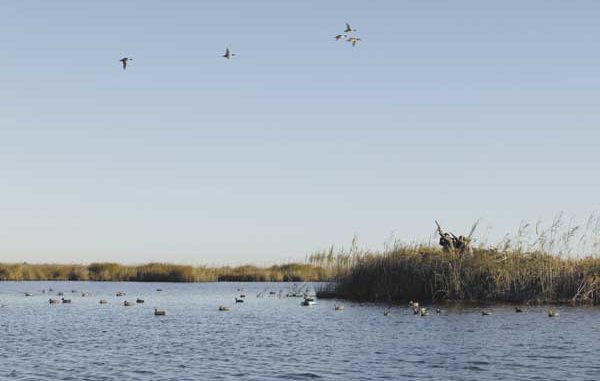
Aggressive calling pays dividends – if you know what you’re doing.
The water was high, but it wouldn’t be for long.
A northwest wind baring fangs sharpened in Canada tore through our camo coats and waders, making the short night spent in our warm beds seem like some type of surreal fantasy.
This was a serious blow that would drop temperatures to near-record levels later that night, but at this point, the wind was still on a seek-and-destroy mission, hunting down any semblance of recalcitrant warmth that remained, and driving it way out into the Gulf of Mexico.
Working in tandem with a thick cloud deck, the wind seemed intent on stealing the very daylight from the face of the Earth, wrapping the planet in a perpetual dark, bitter night.
It was hell — not the kind of hell where pitchfork-wielding demons poke heathens until they fall off cliffs into pits of eternal fire.
This was the naked, raw, bitter hell of Siberia, or the Northwest Territory.
It was hell, but it was perfect.
I looked over at my duck-hunting buddy, who was sitting on a spin-top camo bucket. Tall strands of wire grass shrouded his front and sides, and the remnants of a mong bush shielded his back from the sight of our wary prey and the teeth of the driving wind.
Bobbing in front of us like corks on a river were five dozen decoys, meticulously placed in haggard groups so they wouldn’t appear meticulously placed. Roughly centered among the groups was a beautiful landing area.
Beneath the ruffled surface, long strings of widgeon grass bowed in deference to the falling tide. Other aquatic flora, mainly hydrilla and Eurasian milfoil, seemed to huddle in large matted packs as if bracing against the cold.
My buddy and I exchanged knowing grins. The morning was made for us. This is certainly how soldiers must feel while watching the unsuspecting enemy stumble headlong into an ambush.
Legal shooting time had come and gone, but day didn’t really break. The opacity of the sky wouldn’t allow it. The heavens, which had glowed an eery orange pre-dawn with the ambient light of Earth, gradually turned grey. That was the only clue to us that it was daytime.
It was apparently the only clue the ducks needed. A cloud of them arose on the large lake a half mile from our pond, and we knew what would ensue.
We waited for the first group to get into call range, and greeted them with mighty hail salutes.
The lead bird, a gray duck, craned his neck and pitched his wings. It was obvious he was interested. The nine grays behind him, like lambs to the slaughter, followed his every move.
Though the group was approaching from downwind, No. 1 apparently wanted to gain a better look before casting the fortunes of the flock into the pond.
With more starts and stops than a presidential candidate, the lead bird flapped around the edge of the pond.
Working as a team, my buddy and I gave soft, relaxed greeting calls, and the lead bird, with the rest of the flock following dutifully along, continued arcing over the perimeter.
Soon the flock was directly over our heads, continuing their pass over the edge of the pond.
After the birds had moved over the blind, we gave reassuring feed calls, and No. 1 seemed to be satisfied. He turned his white belly into the wind and locked his wings like a 747.
The rest, positioned a bit higher above the pond, followed in dramatic twists and turns.
We opened up with a cannonade that was momentary but brutal. As always, I rushed my first shot, but downed birds with my second and third shells. My buddy scored two as well.
The remaining six ducks flew off, probably vowing to find a new leader or live forever on the big lakes.
But the sky was alive with ducks that were oblivious to what we had just done to their comrades. We let out hail calls, and soon another flock was putty in our hands.
On days like these, when conditions are perfect, any shmoe in a duck blind is Eli Haydel. Even if he’s not entirely sure which end of the call to blow, he is suddenly the master of all ducks.
Great conditions will do that.
But on days when ducks would rather alight on an alligator’s nose than on any pond with a bunch of stiff, plastic ducks next to a box-shaped house of straw, smooth calling can be the difference between an empty bag and a respectable haul.
Guide Mike Smith of Poydras knows that to be the case. Smith, who spends nearly every day of a typical duck season hunkered in a marsh blind on his Reggio lease, is an aggressive caller, and he makes no apologies for it.
Rejecting the old axiom that you only call at the tail end of ducks, Smith keeps a Haydel’s or Duck Commander call pressed to his lips as long as there are ducks within range of the sound.
“I call from the moment I see them until I pull the trigger,” he said.
But before he ever blows a call, Smith tries to gauge the mood of the birds he sees.
“First, you have to learn how to read the birds, whether they’ve just been shot at or are heading somewhere far away, or whether they’re looking for somewhere to land,” he said. “I’ve got customers who want me to call at every duck in the sky. You’re really just wasting your time when you do that.”
After he determines that a far-off duck or a flock of ducks is looking to alight or is otherwise call-able, Smith will hit them with a 20-note hail call, which he admits “sounds ridiculous.”
But there’s a method to his madness.
“If it’s windy, those ducks are only picking up pieces of that long string of notes,” he said. “It’s like if you were on one side of the Superdome and I was on the other and I screamed 20 words to you. You might only hear two or three words.”
If the birds hear snippets of that hail and show some interest, Smith will hit them with another hail if the birds are far off, or if they’re closer, blow five-note greeting calls.
“The closer they get, the more natural you have to sound,” he said.
Once it’s obvious the birds have visually spied the decoys and are showing strong interest in the pond, Smith will hit them with repeated three- to five-note greeting calls. These calls are short in duration, and are intended to make the ducks feel very welcome.
“I really get excited with the call,” he said. “It’s constant — quack-quack-quack, quack-quack-quack, quack-quack-quack.
“I used to stop calling when the birds got that close, but now I find it’s better to keep them interested.”
The only time Smith lays off the call is if the birds circle directly over the blind.
“If they’re above us, I want everybody looking down, and I’m not going to call,” he said. “I don’t want to draw attention to the blind.”
As soon as the ducks get past the blind, however, Smith continues with the fast series of greeting calls, especially if the birds continue to look interested.
When they’re just about ready to commit, Smith will mix in some tweets on his pintail/widgeon whistle, even if there are no pintails or widgeon in the flock.
“It gives the birds confidence that those are real ducks down there,” he said. “Especially late in the season, that’s important. Those birds have heard hard calling for months.”
If the birds at any point turn tail and begin heading away from the pond with a sense of purpose, Smith will blow a long, plaintive comeback call.
“Usually when that happens, though, they’ve seen something they didn’t like,” he said. “You can sometimes call them back, but they’re usually heading somewhere else by that point.”
The only time Smith scales down his calling is on foggy days. When water droplets fill the air and visibility is low, Smith pulls out a soft timber call like a Duck Commander Brown Sugar or Haydel’s timber call.
“On a foggy day, that call echoes all around you, so you don’t want to be blowing a loud call,” he said. “The ducks really can’t key in on it.”
The opposite is true on very windy days. In blustery conditions, Smith wants the loudest call in his arsenal.
Smith always watches the forecast the evening before a hunt, and he’ll take along the three calls he thinks most fit the forecast conditions. Those always include a mallard call, a gray duck call and a pintail/widgeon whistle.
“My main all-around call is a Duck Commander Reacher,” he said.
For Smith, part of the allure of calling is entertainment.
“Like a good retriever, calling definitely adds to the fun of the sport,” he said.
But it’s also an important key for success. In fact, Smith ranks it in the top four of the most-important ingredients for a successful duck hunt.
“First,” he said, “you need to be where the ducks are. It doesn’t matter how good everything else is, if you’re not in an area that’s holding ducks, you’re not going to kill many ducks.
“Second, you need to be well-hidden. Third, you need a good-sized spread of well-placed decoys. And fourth, you need to know how to call.”
Smith said there really is no substitute for that last ingredient.
“Rather than relying on calling, a lot of guys now are taking their chances with that Roboduck,” he said. “Sometimes Roboduck works, sometimes he doesn’t.”
Smith does admit, however, that there are days when even the worst callers can’t seem to keep the ducks away.
“New birds will usually come in no matter how you call,” he said.
To prove the point, on a hunt about 10 years ago that was going exceptionally well, Smith saw a flock of grays that looked interested. Rather than greeting them with the standard call, he played a non-stop version of the Mexican Hat Dance on his duck call.
“The flock came in like that was a totally natural thing for them to be hearing,” Smith said.
Esta Eli Haydel, senor.
Waterfowl guide Mike Smith can be reached at (504) 682-2953.


